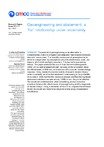

Credits: CC My Manatee – Flickr.com
The potential of geoengineering as an alternative or complementary option to mitigation and adaptation has received increased interest in recent years. The scientific assessment of geoengineering is driven to a large extent by assumptions about its effectiveness, costs, and impacts, all of which are highly uncertain. This has led to a polarizing debate.
This paper evaluates the role of Solar Radiation Management (SRM) on the optimal abatement path, focusing on the uncertainty about the effectiveness of SRM and the interaction with uncertain climate change response. Using standard economic models of dynamic decision theory under uncertainty, we show that abatement is decreasing in the probability of success of SRM, but that this relation is concave and thus that significant abatement reductions are optimal only if SRM is very likely to be effective.
The results are confirmed even when considering positive correlation structures between the effectiveness of geoengineering and the magnitude of climate change. Using a stochastic version of an Integrated Assessment Model, the results are found to be robust for a wide range of parameters specification.
A previous version of this paper was circulated under the name “Geoengineering and uncertainty”.
The authors would like to thank Michael Ghil and participants of a Workshop on Coupled Climate-Economics Modelling and Data Analysis at ENS, Paris and of the FEEM-CMCC convention 2012 in Venice for very helpful comments.
This report represents the Deliverable P145b developed within the framework of Work Package 7.1.2 of the GEMINA project, funded by the Italian Ministry of Education, University and Research and the Italian Ministry of Environment, Land and Sea.
CMCC Divisions


